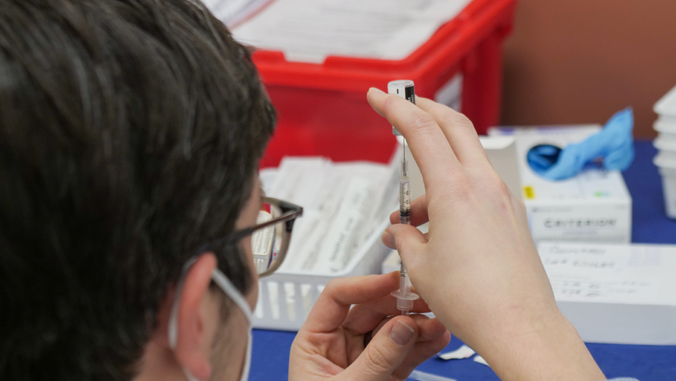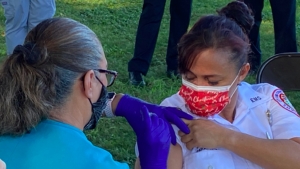
Now that COVID-19 vaccines are more readily available, the next major public health challenge facing the state is getting people vaccinated. According to a recent study led by a team of researchers at the University of Hawaiʻi Mānoa College of Social Sciences as part of their Health Policy Initiative, targeted communications strategies may hold the key to encouraging more eligible people to get vaccinated.
The report, “Communicating about COVID-19 Vaccinations: Recommendations for Hawaiʻi,” identifies four primary types of barriers to vaccination:
- Access: Problems associated with actually getting vaccinated, such as difficulty in traveling to vaccination sites or scheduling appointments, or vaccine shortages.
- Perceived harm: Concerns about the safety of or negative impact of the vaccine on health.
- Mistrust: Beliefs that the government, scientists, pharmaceutical companies or medical establishments are not trustworthy and/or that vaccines are neither necessary nor effective.
- Specific Beliefs: The belief that the vaccine was developed “too fast” and thus may not be safe.
Researchers looked at data from Hawaiʻi adults who have not yet received the vaccine to identify common barriers and provided communication strategies to address them.
Between 700 and 900 Hawaiʻi residents were surveyed in each bi-weekly PULSE survey by the U.S Census Bureau.
Research team members include:
- Jessica Gasiorek, associate professor, Department of Communicology
- Amy Ebesu Hubbard, professor and chair, Department of Communicology
- Hye-ryeon Lee, professor, Department of Communicology
- Ruben Juarez, professor, Department of Economics and UHERO
- Jack Barile, interim director, Social Science Research Institute; associate professor, Department of Psychology
“Here in Hawaiʻi, 31% of the adult population have received at least one dose, and 36% have indicated that they will definitely get the vaccine,” said co-author Ebesu Hubbard.
Added Lee, “The complication is that, while individuals may say they will get a vaccine, for several reasons, they may not be able to follow through. This issue, along with 30% of Hawaiʻi adults expressing hesitancy about receiving a vaccine, is a concern.”
“Will definitely get the vaccine”

36% of respondents reported that they will “definitely” get the vaccine. This group, which tends to be older, primarily faces access barriers, such as the inability to obtain a vaccination appointment due to a lack of computer access/skills or busy phone lines; the need for transportation to and from a vaccination site; or the inability to take off time from work.
Messaging to this group should come from trusted sources such as the Department of Health, scientists, medical professionals, professional/organizational leaders and community leaders. It should focus on reducing access barriers and providing concrete “calls to action.” For example, clearly announcing when new groups are eligible; informing the public that assistance is available to make online vaccination appointments and when transportation is available to and from vaccination sites; and encouraging employers to provide workers with paid time-off from work.
“Will probably get the vaccine”
19% of respondents report that they will “probably” get vaccinated. This group, which includes individuals with different levels of education and of whom just over half are between 25-54 years of age, reports concerns about perceived harm and a deference to others as reasons for being hesitant.
“The vaccine hesitancy for this segment is driven by concerns about vaccine safety and side effects, as well as a feeling that there are others who may need the vaccine more. To address these barriers, it is important to acknowledge that, while side effects can occur, most reactions are normal and not dangerous,” said co-author Gasiorek. “It will take time to persuade this group that the vaccine is safe, effective and beneficial for them to receive. Because of this, messages targeting this group should begin now, even though vaccine supplies are still in short supply.”
“Will probably not get the vaccine”
9% report that they will “probably not” get vaccinated. This group is generally younger, with less formal education, and is disproportionately non-White and non-Asian, with the majority identifying with two or more races. This group shares concerns about safety and side effects with other groups but is also concerned about whether a vaccine will work. They are generally a bit more skeptical of this vaccine.
“Communication strategies for this group should address these concerns, as well as their mistrust. It is recommended that messaging come from friends, religious leaders or respected community elders that these individuals trust rather than government officials or scientists,” said Juarez.
“Will definitely not get the vaccine”
3% report that they will “definitely not” get the vaccine. Younger and with less formal education, this group is disproportionately female. Relative to Hawaiʻi’s population, individuals identifying as White or as two or more races are overrepresented. This group is strongly anti-vaccine and anti-vaccination and does not trust vaccines or the government.
The report said it is highly unlikely that these group members can be persuaded to change their minds. The most effective approach may involve the implementation of policies or regulations for certain activities. For example, making vaccinations mandatory to access air travel, or requiring them to work at or to patronize certain businesses, might motivate people in this group to get vaccinated.
“Communicating about COVID-19 Vaccinations: Recommendations for Hawaiʻi” is presented by the UH Mānoa College of Social Sciences in partnership with First Insurance Company of Hawaiʻi. It is part of the Social Sciences Effect series, which is aimed at solving Hawaiʻi’s most urgent societal challenges through bold, collaborative action.
This report is an example of UH Mānoa’s goal of Excellence in Research: Advancing the Research and Creative Work Enterprise (PDF), one of four goals identified in the 2015–25 Strategic Plan (PDF), updated in December 2020.

